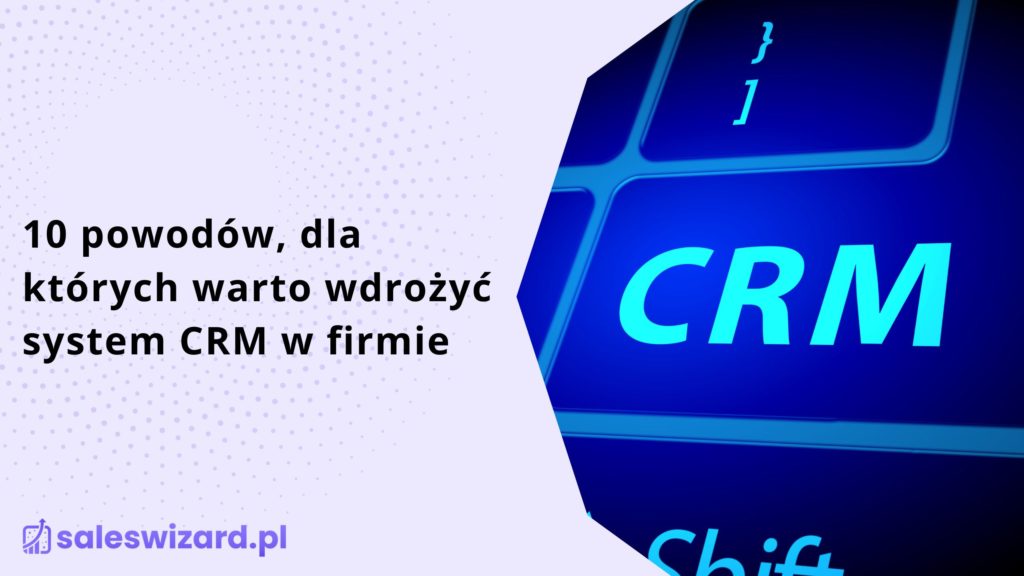10 reasons to implement a CRM system in your company

Every successful businessman knows how important it is to maintain good relations with his contractors. This would not have been possible without a certain dataset that contained the most important contact information. This role used to be fulfilled by notebooks, business card cases and address books, but today they have been almost completely supplanted by CRMs. Although a CRM system is already standard in many companies, there are still those who doubt the wisdom of this investment. Here are 10 reasons why you should implement a CRM system!
1. CRM is a versatile, multi-tasking tool
We expect most tools to be as comprehensive as possible. Instead of spending money on several different applications, we want one system to have a range of functionality within it. Such is the case with the CRM system, which is the “central communication port” in the enterprise. With its help, you are able to oversee and manage every stage of the sale – from initial contact through negotiations to finalization and after-sales service. Many plug-ins and document databases can be plugged under CRM systems, so you can quickly generate a contract, present terms of service or demonstrate cooperation options. Some CRMs also allow invoicing, so you will improve communication between the sales department and the billing department. These are just examples of how versatile a CRM system is and how many areas you can realistically manage with this single tool.
2. the CRM system is a collection of all contact information
Can you imagine a situation where one employee has to answer phone calls, carry on a live chat conversation, answer emails and manage social media messages? In the long run, this is impossible – there will always be an area that is not taken care of well enough. The solution to such a situation is CRM, which allows centralization of communication channels. Such functionality avoids the confusion of handling several or even a dozen communication channels. A properly programmed CRM will be able to forward requests to the appropriate departments, for example, an email sent to “sprzedaz@a-b-d-e.pl” will go to the sales department, and “pomoc@a-b-d-e.pl” will forward the request to the helpdesk group. The collection of all data in one place is a huge convenience and a significant convenience, especially when you create advertising campaigns that include contact forms.
3. CRM is not only current data, but also historical data
Why do we compare CRM to an upgraded and digitized data notebook? Not only because it is a collection of contacts and annotations related to the customer. It is primarily a catalog of records and historical information – who contacted whom, when, at what time, on what day, and for what reason? How did the conversation go and which services were offered to the client? Did the sale take place, and if not – what was the reason for the refusal or postponement of the transaction? What was the customer’s reaction to the goods or service, was he or she satisfied with the service? The answers to these and many other questions can be found in the CRM system, which monitors and records work with each customer. Your employees can also add annotations about the course of the conversation – is the customer aggressive and hostile, or perhaps the opposite: reporting a willingness to cooperate? Historical data can prove very helpful in constructing new offerings.
4. introduction of CRM helps standardize customer service
Imagine a situation in which you and two of your friends belong to the same bank. Your account manager would call you every six months or so to ask about your satisfaction with the service and to let you know about a new loan offer. At the same time, one of your friends would have at least two phone calls a month, and the other would have no contact at all with his caregiver. Unfortunately, however, such heterogeneity in customer service and lead taking is causing some pretty serious image cracks. A customer of a particular bank (but not only, it could be a cell phone, Internet provider or insurance agency) gets the impression that there is chaos inside the structure. That some vendors actually want to help us and ask around, leaving room for conversation, while others bombard us with offers just to sell something. The CRM system offsets this problem and helps handle leads, being the basis of customer service standards.
5. CRM helps you keep track of the various stages of sales
Has it ever happened to you or your employee not responding to an email on time, causing the company to lose a sales opportunity? Such a situation can be annoying, especially when the terms of the contract were initially accepted and the customer seemed determined. Sometimes it’s a matter of a flurry of cases where it’s impossible to stay on top of the implementation, sometimes we simply forget to forward the client for further processing. Fortunately, the CRM will relieve users of the need to keep track of deadlines. The system will set up alerts on its own, reminding you of the end dates and critical points of each activity. What’s more, many of the CRMs have a mechanism to integrate with the calendar, so the employee will see a notification panel next to the date and learn what he or she needs to do today. Human memory can be unreliable, so CRM will provide excellent support through reminders and messages.
6. the CRM system is very simple and convenient to use
One of the most common reasons associated with hesitation to purchase a CRM system is sheer reluctance to change. With that said, this is not a conservative mindset and glorification of contact notebooks over electronic solutions. Such a situation is most often related to the fear that the CRM system will simply be too difficult to use. However, the truth turns out to be quite different – the whole thing is intuitive, and even those who have never used a CRM system before can handle the system. If in doubt, we can use the help menu – the various functionalities and subsequent actions are explained step by step in a special tab. For entrepreneurs starting cooperation with us, we are able to prepare a special implementation training on the use of CRM. What’s more – for our CRM system, you can get support when you contact the SalesWizard team.
7. CRM will help you control the quality of your employees’ work
It’s no secret that one of the tasks of a CRM is to monitor employee performance and measure progress toward sales goals. Since the entire process takes place inside the CRM system, a number of parameters can easily be set. How many of the scheduled contacts were taken by an employee during a single shift? During which hours did customers engage in conversation most often and least often? How many customers have you successfully guided through the entire sales process? What were the most common reasons for refusing to purchase goods or services? Did the employees follow the established standards for working with customers during the contact? See how many answers you can get by implementing a CRM system and related statistics. Now you will clearly see the quality of a particular team and an individual employee within the customer service department.
8. the CRM system stores data in a secure manner
We live in an era where data protection is a value that is particularly valued, as demonstrated by the array of consents and clauses displayed on websites. It’s no different when it comes to processing data as part of your day-to-day work in a CRM system. As SalesWizard, we place great importance on implementing and improving the protection of the data residing in the CRM. A CRM system is the most secure way to store and process personal data. Employees can access those customers they actually work with – without the risk of confidential information being leaked as a result of a hacking attack. Our SalesWizard CRM system has a number of advanced security features, so we can say without a shadow of an exaggeration that this solution is far safer than keeping a notebook with contacts, a book with addresses or using other physical, non-digitized storage media.
9. in the event of a dispute, the CRM has an evidentiary function
Consumer-business conflicts are phenomena that will affect your company sooner or later. What’s more – a great many customers make claims and resentments against employees that are not justified. This does not change the fact that each person must be guaranteed a fair and equitable complaint procedure. Such will be possible when we look at the actions performed with a given customer – listen to the transcript of the conversation, read emails or annotations. CRM will ensure that the dispute is not just a “word against word” conflict; the system and the data stored in it will make it possible to decide unequivocally which side is right. Perhaps the employee did not provide full information, which will verify the recording of the call, and in this situation it will be necessary to grant the complaint. It may also turn out that it is the customer who is in the wrong, in which case we can accurately determine what the facts are. The CRM system undoubtedly fulfills its evidentiary function in disputes that arise.
10. CRM is an effective method of automating processes
An advantage that follows directly from the above benefits is that a CRM system is an ideal solution for process automation. Forget about carrying a draft contract to another department, sending it by fax or photocopy. All you have to do in the CRM is to click the appropriate button, and the next action will be delegated to the right person to perform. You also don’t have to worry about a given piece of information being distorted as a result of being passed from one person to another. Any notes, remarks, annotations remain throughout the customer service process, thus minimizing the risk of human error. This, in turn, translates into reduced work time on a single contact, reduced costs and a real opportunity to increase employee efficiency. With a traditional carrier, manual application of information and physical circulation of correspondence, it is possible to complete 1 to 3 contacts per hour. Having a CRM, you will easily complete the handling of at least 10 contacts at the same time, and the whole process will be much less tiring.
